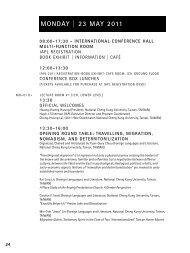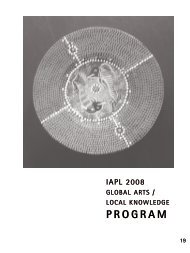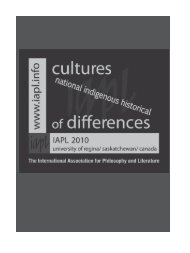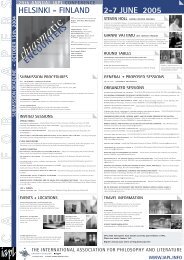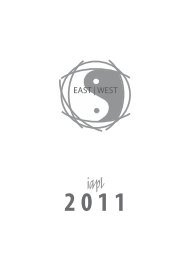IAPL2012-CB-0531-052.. - The International Association for ...
IAPL2012-CB-0531-052.. - The International Association for ...
IAPL2012-CB-0531-052.. - The International Association for ...
Create successful ePaper yourself
Turn your PDF publications into a flip-book with our unique Google optimized e-Paper software.
communist bloc, but also a vision of the world revolving around class struggle and<br />
more widely a vision of politics as a practice of conflict and a horizon of emancipation:<br />
not only revolutionary hopes or illusions, but utopias and ideologies in general, or, in<br />
the most comprehensive <strong>for</strong>mulation, “grand narratives” and beliefs about the destiny<br />
of humankind—not only a period of history, but “history” itself understood as the time<br />
of a promise to be completed. <strong>The</strong> time in which we live can thus be described as the<br />
time that comes after the end, a time “post”.<br />
We must have a closer look at the narrative of the end and ask the question: what<br />
exactly has come to an end? What exactly are those “grand narratives” that are said to<br />
be over? A “grand narrative” means a global plot that proposes an understanding of the<br />
global evolution determining the trans<strong>for</strong>mations of our lived world. What is said to be<br />
over, is the optimistic narrative making history both a principle of intelligibility of the<br />
“state of things” and the scene of a possible trans<strong>for</strong>mation of that “state of things”.<br />
That narrative entailed two main theoretical articulations. In the first case, evolution is<br />
linked with knowledge: evolution produces knowledge of the evolution which, in turn,<br />
allows those who know to have an impact on evolution. In the second case, the state<br />
of things is linked with the possibility of its destruction: the same reasons that account<br />
<strong>for</strong> the existing order are the reasons <strong>for</strong> which it will be superseded. <strong>The</strong> future will<br />
happen <strong>for</strong> the same reasons that hinder it from being present. <strong>The</strong> most accomplished<br />
<strong>for</strong>m of narrative was given by Marxist theory. <strong>The</strong> same necessity that has produced<br />
the state of things named capitalist exploitation has also produced knowledge of<br />
that state of things, knowledge of the historical necessity entails the destruction of<br />
capitalist exploitation. Knowledge gives both the intelligibility of the phenomena of<br />
our lived world and the weapon in the struggle <strong>for</strong> a new world.<br />
In short, the idea of the grand narrative entails a sense of the historical evolution, a<br />
sense of the intelligibility of our lived world and a sense of its possible trans<strong>for</strong>mation.<br />
My point is that what is described as the end of that narrative, what is presented<br />
as the “time in which we live” is in reality a rearrangement of those elements. Our<br />
time —meaning the dominant description of the state of things that constructs the<br />
frame of our present—has not eliminated historical necessity. Nor has it eliminated the<br />
Marxist mode of intelligibility of our lived world. It has only disconnected them from<br />
the sense of the possible with which they were linked. <strong>The</strong> celebrated end of the grand<br />
narrative changed only one articulation in that narrative: it changed the way in which<br />
it staged the relation between the possible and the impossible. But, even in doing that,<br />
it remained faithful to its logic.<br />
66



